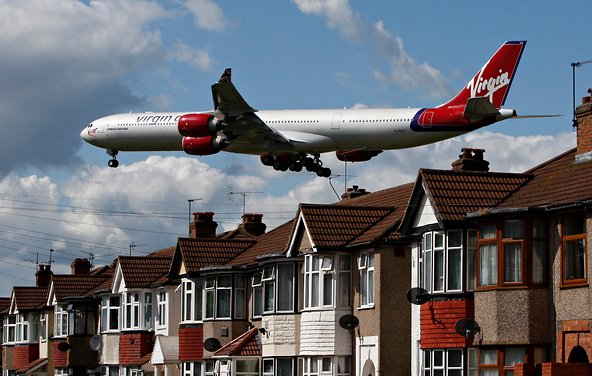 Luke Macgregor/ReutersA transaction would be the latest in a round of mergers that has reshaped the airline industry, as companies in the United States and Europe have looked to consolidation to restore profitability.
Luke Macgregor/ReutersA transaction would be the latest in a round of mergers that has reshaped the airline industry, as companies in the United States and Europe have looked to consolidation to restore profitability.
Delta Air Lines is in talks to buy Singapore Airlines’ 49 percent stake in Virgin Atlantic Airways, in an effort to bolster its international operations, particularly flights between New York and London, a person briefed on the matter said on Sunday.
Talks are continuing but a deal will not be announced soon, this person said. Singapore Airlines confirmed that it was in discussions about a potential sale of its Virgin stake, but provided no further details.
A transaction would be the latest in a round of mergers that has reshaped the airline industry, as companies in the United States and Europe have looked to consolidation to restore profitability.
With oil prices remaining stubbornly high and the economic outlook uncertain, many airlines have continued to struggle. That may precipitate even more takeovers, analysts say.
A deal would also be Delta’s most significant strategic move since its 2010 merger with Northwest Airlines, which made it the biggest American carrier until the union of United Airlines and Continental Airlines last year.
It would provide more access to London’s Heathrow Airport, one of the world’s busiest, and expand Delta’s North Atlantic business.
It would also bolster its partnership with Air France KLM, Europe’s biggest airline. Both companies are part of the Sky Team global alliance, and also run a joint business in the North Atlantic market, sharing flights, revenues and costs.
“Delta has shown time and time again that it is extremely opportunistic,” said Brett Snyder, an airline expert. “If it sees a good opportunity, nothing is off the table.”
If it proceeded, a transaction would directly challenge the Oneworld global alliance, whose biggest members are American Airlines and British Airways. The two airlines have an international joint venture. Virgin does not belong to any of the three major airline alliances — Star, Oneworld and Sky Team — depriving it of the ability to coordinate flights and cut costs, which has helped many of its competitors. Star’s major carriers are United, US Airways and Lufthansa. The deal would also give Virgin a strong partner as it struggles to compete against rivals with deeper pockets. Founded by Richard Branson in 1984, the company has long embraced an image of fun travel and cheaper fares.
But that has not helped the airline’s financial condition of late. Virgin lost £80 million, or $128 million, in the year that ended in February, compared with a profit of £18.5 million in the previous year.
The company has been under pressure from the likes of British Airways, whose corporate parent, IAG, bought BMI British Midlands earlier this year. Virgin fought against that deal, arguing that it would give British Airways too much of a presence at Heathrow. But the takeover was completed, after IAG complied with a European Commission order to give back 14 slots at the airport.
The deal may also pave the way for an eventual change of control of Virgin. The company’s chief executive, Steve Ridgway, told The Financial Times in an interview in January that Mr. Branson was prepared to sell some of his 51 percent controlling stake in the airline.
“For Virgin, it’s an exit strategy in an environment where they are being marginalized by alliances on the Atlantic,” said Robert W. Mann, an airline analyst based in Port Washington, N.Y.
A Delta spokeswoman declined to comment. A representative for Virgin was not immediately available for comment.
Article source: http://dealbook.nytimes.com/2012/12/02/delta-ponders-stake-in-virgin-atlantic/?partner=rss&emc=rss